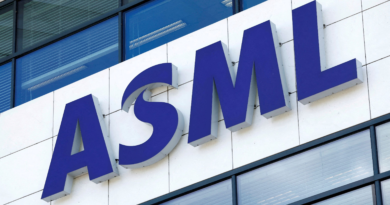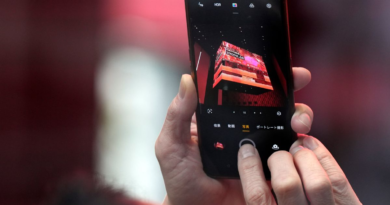ASML, the computer chip giant that’s key in the tech war between the US and China – EL PAÍS USA
The Dutch company ASML leads the global production of photolithography equipment, which is essential for the semiconductor industry. The firm is the corporate jewel of the Netherlands: its shares have risen in value by 420% over the last five years, with a total valuation of more than $350 billion. It’s currently ranked as the 22nd most valuable company in the world.
What’s the secret to ASML’s success? Well, it creates complex machines for the manufacture of computer chips… technology that has become key in the transition to the digital economy. Giants such as TSMC, Samsung, or Intel depend on these semiconductors.
ASML’s exponential growth is even more impressive when you take into consideration the impact of geopolitics on its business. The restrictions on the export of some of its equipment to the Chinese market — something that the United States has demanded of the Dutch government — go beyond the finances. Washington wants to counteract Beijing’s technological development for geostrategic reasons — hence, this has led to a chip dispute. In this Sino-American struggle, the European Commission — and the 27 members of the EU — may end up having a greater role.
The US government doesn’t want China to copy other countries’ technology and apply high-end chips to the military field. Hence, it has blocked the sale of cutting-edge American machines to China for the manufacture of semiconductors. The Biden administration has pushed its allies to do the same, whether through agreements, diplomatic pressure, or the introduction of new restrictions. For instance, it has laid out a rule that prohibits the sale of photolithography equipment to China that contains even a single American part, curbing the export capacity of many non-American firms.
ASML’s near-monopoly in the field of advanced lithography systems has put it in Washington’s spotlight. In this context, in 2023, the Dutch government added more types of machines to a restrictions list, prohibiting certain systems from being sold to several of ASML’s Chinese clients. The license freeze was set to come into effect this past January 1. Previously, China imported $1.1 billion worth of chip technology from the Netherlands, according to Bloomberg’s calculations. Beijing’s response to the restrictions was clear: “The Netherlands must respect the law.”
In October of 2023, then-Trade Minister Liesje Schreinemacher admitted before the Dutch Parliament that, although they had negotiated directly with the United States, she thought that the matter “should be addressed at European level and in coordination with other member states of the EU.” The Dutch Ministry of the Interior — in response to questions on the matter from EL PAÍS — didn’t wish to comment “on specific permits or on matters relating to our national security.”
According to Dutch journalist Marc Hijink, “the final use of microprocessors cannot be clearly determined.” In a telephone conversation with this newspaper, he explains that ASML needed at least 15 years to develop its most advanced machinery. Today, it’s the most valuable technology company in Europe. “The Netherlands usually aligns itself with the United States on things such as export control in the field of semiconductors… but since ASML’s latest technology is light years ahead of its competitors, [Dutch] politicians could have been a little more assertive in their negotiations with Washington,” he points out.
When asked what steps could have been taken, he responds: “[We could have cooperated] with other European countries. Joining forces is the way to face challenges of this magnitude.” Although Hijink believes that the collaboration may eventually happen, he maintains that it will take time and will require “politicians who are capable of understanding ASML’s role in the global economy. And those are rare.”
In 2023, the company had a turnover of more than $28 billion… 30% more than the previous year. And it had a profit of over $8 billion, compared to the profits of just over $6 billion obtained the year before. ASML may be less-known to the general public than other firms of Dutch origin — such as Shell or Philips — because, as Hijink notes, “it doesn’t sell consumer technology.” However, the firm’s machines make the chips that appear in most of the devices we use: from cars and phones, to computers and ChatGPT.
The photolithography that’s the backbone of the geopolitical conflict between the US and China uses light of a shorter wavelength to draw — with great precision — the very fine lines of the base of the microprocessor: a type of silicon wafer. The thinner they are, the more they can fit on a chip. This increases its power and speed.
There are two models in contention in this story of industrial innovation, which has transformed into a struggle for economic and military power. The first — the extreme ultraviolet photolithography (EUV) machine — has had an export blockade to China since 2020. This technology — exclusive to ASML — is used to create very complex patterns on silicon wafers. “It uses light with a wavelength of 13.5 nanometers: the shorter it is, the smaller the characteristics of the microchip that can be printed,” according to the company. A nanometer (nm) is equivalent to one billionth of a meter. With this machine, chips smaller than 10 nanometers can be developed. At the moment, an EUV machine is worth about $200 million, while the next generation will cost close to $400 million.
The other model is deep ultraviolet (DUV) photolithography, whose wavelength is 248 and 193 nm. It costs between $80 and $90 million per machine. And the new restrictions may affect between 10% and 15% of sales to China, as acknowledged by Roger Dassen, ASML’s CFO. In a video released by the company, he says that he expects demand for older equipment (exempted from new restrictions) from Beijing to remain “very, very strong this year and into the future.” In 2023, the firm made 29% of its sales in China. It was its second client behind Taiwan (30%). Third place was occupied by South Korea (24%).
Currently, ASML is a company in the hands of large global investment funds, such as Capital World Investors, the T. Rowe Price Group, or Fisher Asset. It was founded in 1984 by the multinationals Philips and Advanced Semiconductor Materials (ASM). It currently has its headquarters in Veldhoven, a town in the southern Netherlands. About half of its more than 42,000 employees work there, 40% of whom come from abroad. In 1995, it went public: Philips sold half of its shares in the listing. In the following years, the rest were sold off.
ASML’s forecasts for 2024— despite commercial restrictions — are optimistic. It expects to bill figures similar to those obtained in 2023, thanks to the greater demand for chips due to the artificial intelligence boom.
ASML operates almost like a monopoly. It’s not easy (for now) to compete with its business. But in the world of technology, everything is a matter of time. “China can accelerate its own chip-manufacturing industry spurred by negative exports,” warns Peter Wennink, the company’s executive director, upon learning of the new obstacles. ASML wants to trade with everyone, including China. Will this be possible?
Sign up for our weekly newsletter to get more English-language news coverage from EL PAÍS USA Edition
Suscríbete y lee sin límites

